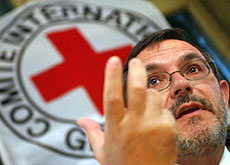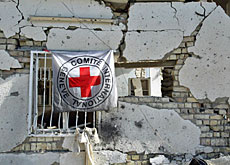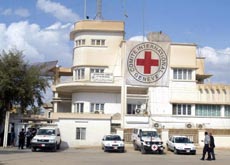“We’re always caught in the middle”

The International Committee of the Red Cross (ICRC), which for 140 years has helped the victims of war and violence, has in recent years become a target itself.
swissinfo spoke to Angelo Gnädinger, the ICRC’s director-general, about recent attacks in Afghanistan and Iraq.
The ICRC has been active in Iraq since 1980, but independence and neutrality no longer seem to guarantee protection.
A car bombing in October on the agency’s Baghdad office killed 12 people.
Gnädinger was speaking on the eve of the 28th International Conference of the Red Cross and Red Crescent, which aims to establish Red Cross policy for the next four years.
All 179 national Red Cross and Red Crescent societies will be in Geneva, together with the International Federation, the ICRC and the 191 states parties to the Geneva Conventions.
swissinfo: Since the October attack, the ICRC has temporarily closed operations in Iraq. Is this a capitulation to violence?
Angelo Gnädinger: No. You can talk about violence but not about capitulation. We’re not just facing difficulties in Iraq. In the summer, we experienced a very tricky period in Liberia.
We’re working in virtually every crisis region in the world, including Colombia, Liberia and Indonesia (Aceh). The violence, which we’re beginning to face, is real and we must take it seriously, but we remain very motivated and active.
If someone really won’t accept us, and if our colleagues on the spot think that we have to close an office, then we’ll do it. We’re not dodging our responsibilities – our mandate. We have to find new means and ways of carrying out our work.
swissinfo: The ICRC is itself the target. What’s gone wrong? Have the developments of the last few years, particularly the US “war on terror” after September 11 made your work harder?
A.G.: Today, we face situations where the warring parties are unequal. States and their armies are opposed by nebulous, indefinable groups, which are hard to pin down and hard to contact. We have to find ways to explain to these groups what we do and that by the very nature of our work, we’re always caught in the middle.
Today, there’s a tendency for one side to try and get us to work with them and for the other side to regard us as an enemy. This is the challenge we face.
swissinfo: Do you think that respect for the Geneva Conventions is waning?
A.G: No, I think it would be wrong to talk about respect waning. Because of the terror attacks, the Geneva Conventions are spoken about much more today.
More and more people know their contents, particularly those most affected. And they fight for these rights, particularly civilians.
So knowledge and recognition are there. The Geneva Conventions were drafted in the West but they incorporate universal values and were adopted by the community of states.
International humanitarian laws stand as a bulwark between civilization and barbarity.
swissinfo: Do you agree with the suggestion that the Geneva Conventions need to be reworded precisely because they were drafted in the West?
A.G.: The Conventions don’t need to be redrafted but they need to be debated and communicated afresh.
We need a broad debate about the relevance of international humanitarian law. And this question isn’t just one for armies and armed groups. Political and civil society must also take part.
We know Iraq fairly well and assumed that people knew us. Yet now we’ve got to explain ourselves again there.
Today, particularly in Afghanistan, we see the military trying to integrate humanitarian efforts. That raises problems because we’re the go-between and we can’t be part of the military action.
By this, I don’t mean that armies have no responsibilities when it comes to civilians. As an occupying power, their duties are laid down in the Geneva Conventions.
swissinfo: And what can the ICRC do when a country like the United States disregards international law, for example with the prisoners at Guantanamo Bay?
A.G.: We’re doing there what we do in other conflict situations. We have access to the prisoners. Through us, they have contact with their families.
What isn’t resolved yet is the question of the prisoners’ status. Clarification of this is very important.
swissinfo: You’ve been working for the ICRC for 20 years. How do you succeed in motivating yourself for your work, given the growing violence?
A.G.: Now, that I’m no longer active in the field, it can sometimes be more difficult. When I visit one of our delegations and see what we can achieve, then it all becomes clear.
My last boost was from a short visit to Afghanistan and our orthopaedic unit in Kabul. For nearly 20 years, our people there have been doing fantastic work for the disabled victims of war.
swissinfo-interview: Rita Emch
The 28th International Conference of the Red Cross and Red Crescent is taking place in Geneva from December 2-6.
The central theme of this year’s meeting is the protection of human dignity.
The conference will be attended by all 179 national Red Cross and Red Crescent societies, together with the International Federation, the International Committee of the Red Cross (ICRC), and the 191 states parties to the Geneva Conventions.
The foreign minister, Micheline Calmy-Rey, is representing Switzerland.
Lawyer Angelo Gnädinger joined the ICRC in 1984, working in the Middle East and Africa before holding posts in Geneva.
From 1992 to 1994, he was head of the Detention Division.
From 1994 to 1998, he was Delegate General for Western and Central Europe and the Balkans.
From 1998 to 2002, he was Delegate-General for Europe, the Middle East and North Africa.
He took up his post as Director-General in July 2002.

In compliance with the JTI standards
More: SWI swissinfo.ch certified by the Journalism Trust Initiative



You can find an overview of ongoing debates with our journalists here. Please join us!
If you want to start a conversation about a topic raised in this article or want to report factual errors, email us at english@swissinfo.ch.